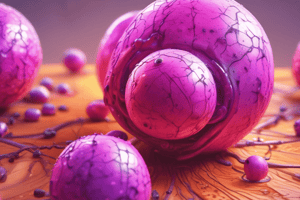Podcast
Questions and Answers
What percentage of cancers have an inherited aetiology?
What percentage of cancers have an inherited aetiology?
- 5-10%
- 20-25%
- 10-15% (correct)
- 30-35%
Which of the following is NOT a risk factor for cancer development?
Which of the following is NOT a risk factor for cancer development?
- Healthy diet (correct)
- Radiation
- Viral infection
- Commercial pesticide use
Which syndrome is associated with an increased risk of gliomas?
Which syndrome is associated with an increased risk of gliomas?
- Down syndrome
- NF1 (correct)
- Klinefelter syndrome
- Turner syndrome
What is the name of the gene associated with inherited retinoblastoma?
What is the name of the gene associated with inherited retinoblastoma?
Which virus is associated with the development of Kaposi sarcoma?
Which virus is associated with the development of Kaposi sarcoma?
Flashcards are hidden until you start studying
Study Notes
Aetiology of Cancers
- Aetiology unclear or idiopathic in most cases, resulting from interaction between environmental factors and host genetic susceptibility
- DNA damage can result from biological processes or exposure to risk factors
Genetic Factors
- 10-15% of cancer cases are inherited
- RB1 gene mutation associated with Retinoblastoma
Childhood Syndromes
- Down syndrome associated with Leukaemia
- NF1 associated with gliomas
Infection-Related Factors
- EBV (Epstein-Barr virus) associated with: • Burkitt's lymphoma • Hodgkin's lymphoma • Nasopharyngeal carcinoma
- Kaposi Sarcoma associated with: • HIV • Human herpes 8 virus
- Burkitt's lymphoma associated with: • HIV • Malaria
Environmental Factors
- Radiation exposure associated with increased cancer risk
- Chemotherapy exposure associated with increased cancer risk
- Commercial pesticide use associated with increased cancer risk
Studying That Suits You
Use AI to generate personalized quizzes and flashcards to suit your learning preferences.





